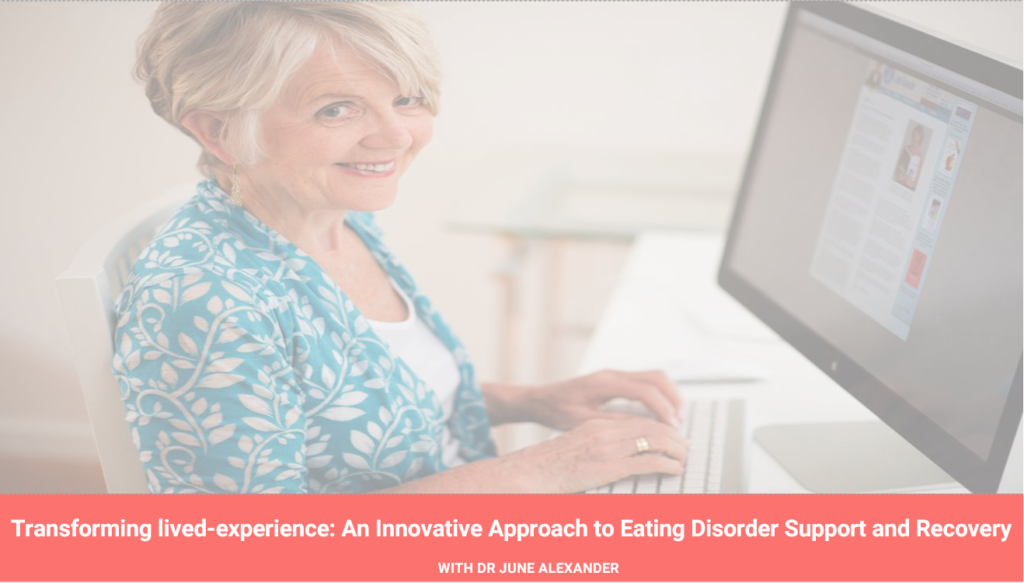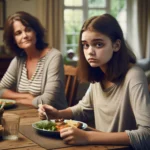Transforming lived-experience into peer support – an innovation in eating disorder recovery

Transforming lived-experience into peer support – an innovation in eating disorder recovery
People who recover from an eating disorder represent a great repository of untapped potential in helping others to heal from this complex illness. This Friday, August 23, together with Olivia Soho and Carly Harris, I will present a workshop that explores peer support and mentoring as an innovative approach in eating disorder treatment and recovery.
This workshop will take place in Adelaide at the 2019 conference of the Australian and New Zealand Academy for Eating Disorders (ANZAED). While our focus will be the Australian situation, the theme has global significance. Australia is developing peer-mentoring programs, but more exploration is needed on how to best utilise ‘expert by experience‘ wisdom. Here is my story:
About my work as a Writing Mentor for People with Eating Disorders
Diary writing helped me to survive and heal from my childhood eating disorder and other trauma. I had my eating disorder for almost 20 years when at age 30 I met the psychiatrist who would save my life. Talking about my feelings after being locked in silence for so long was extremely difficult. My psychiatrist encouraged me to write. It felt safer. Gradually, over the next 25 years, I reconnected with my healthy self.
I met Claire Middleton, founder of The Butterfly Foundation, and she encouraged my emergence into mainstream. I began to share my story about escaping ED’s prison, I began a blog in 2007, became involved in advocacy, and began writing books. Sharing my story helped my ongoing healing, and I began draw on the 44 years of documented experience from my illness, to help others.
After my memoir, A Girl Called Tim, was published in 2011, people with eating disorders wrote letters, expressing hope, that maybe they could recover, too. Writing is a great connecting tool.
This led to an innovative position as a diary writing mentor for inpatients at an eating disorder clinic. Some patients, who had been prisoners of their eating disorder for a long time, like me had difficulty connecting with their healthy thoughts and feelings. The clinic director surmised that sharing with a trusted person who had recovered and who worked with the written narrative, might help these patients, and at the same time, help to inform the treatment team about the patients’ needs.
Indeed, this is what writing mentoring is about – it is about helping the person to separate their self from their problem.
This narrative work introduced me to being part of a team within a health service.
It led to undertaking a PhD in Creative Writing, drawing on lived experience of eating disorders and the narrative, and led to my ninth book, Using Writing as a Therapy for Eating Disorders.
Through sharing my story, and helping others to share their inside stories, I am honoured to collaborate with New Zealander David Epston who, with the late Michael White from Adelaide, pioneered narrative therapy in the 1980s.
At the clinic, the head psychiatrist had one patient who had suffered with anorexia nervosa most of her life and, now in her fifties, still could hardly speak. She had connected well with me as an inpatient – the patients would leave their diaries in a blue box, and I would write responses to them – but what to do when she departed the clinic for home?
So began my work as a registered provider with the National Disability Insurance Scheme (NDIS) in Australia.
This took time to procure because there were no suitable boxes to tick on the registration forms! I had decades of writing and eating disorder experience but no formal mental health training.
With the psychiatrist advocating on behalf of his patient, I persevered, and began to work with the NDIS in 2015, under the Social Community and Civic Participation section. The support item name is:
Life Transition Planning Including Mentoring – Peer Support and Individual Skill Development.
This work continues today. My first client is doing well. Writing helps her to feel like her life counts.
At all times, I am on the same page as the client’s treatment team members. I help to fill the gaps. I meet clients in public places such as coffee shops and libraries, which was scary for my first client at first, but now she strolls in, head held high. We visit the local arts centre regularly. We have a large cappuccino and cake during our weekly session. My client has come a long way in re-entering mainstream and building self-belief.
At our weekly session, she now talks a lot as well as sharing her writing. The terrified mouse has found her roar and it is an honour to witness this amazing self-growth.
Mentoring requests come through health professionals or clients who initiate contact through my website www.lifestoriesdiary.com.
Through identifying with my story, people get the courage to reach out. Often, they have been struggling with their illness for a long time and have yet to access and reveal their private anguish to any health service.
One client had been eating nothing but a particular cake slice for years. That she was still standing was a miracle. Upon gaining her trust, I encouraged her to contact a dietician, and today this client is making slow but sure progress in improving her nourishment and zest for life.
Another client had bulimia and had some very bad experiences through engaging people online whose guidance made the illness worse. I encouraged this young mother to reveal her secret of suffering to her GP, who she had been seeing for years but had felt too ashamed to speak of her eating habits. Unfortunately, when she did, this well-meaning but ignorant GP said: ‘But you are not too thin”. That young mother remembered nothing else from that appointment. Her ED of course was raging: “You are not thin enough!” A lot of writing mentoring was required to encourage her to continue to seek help. She has since had in-patient treatment with expert care and is doing well.
Some clients live close by, and we meet face to face. Others live around Australia, or overseas, and we communicate via Zoom, as well as through the written narrative.
I offer clients trust, respect, understanding, hope, and encouragement to navigate their recovery of healthy self. Narrative mentoring offers the client a self-help tool and offers their health teams valuable insights that they might otherwise not get. If a client has no health team, I encourage them to access one. I help to educate health professionals on what to say and not to say to people with eating disorders. I encourage them to treat their patients with respect and compassion.
Recently a psychiatrist wrote and said: ‘thank you for working with my client; he has shared some of his writing with us, and this is helping us to understand and help him more’.
This is why I do what I do: working with the clients, the health professionals, and their families; being a translator of ED language and behaviours for all sides. In helping others, I nurture myself.
Self-care is vital — I continue to write a diary, debriefing daily. My Staffy, Maisie, walks with me daily, and my mentors, family and friends, help me to maintain a healthy balance.
Mentors bring many benefits to all sectors of the ED field. Everyone deserves access. Let’s make it happen.
So, what is peer work and what are the benefits?
- Peer work is a non-clinical collaborative approach, an add-on to clinical treatment
- Peer workers can help to strengthen and promote recovery in treatment practice
- Peer workers can help to reduce shame and stigma for people with an ED and their families
- Identified benefits include increased hope, improved engagement with treatment and sustained remission of symptoms, post treatment
- For families, benefits include reduced stress and isolation, and more inclusion as partners in the treatment process
The challenges and barriers
- Lack of understanding of the peer work role
- Unsupportive work environments
- Maintaining personal mental well-being
- The most persistent barrier to implementing a peer workforce in eating disorder services appears to be funding
- We need to find ways to integrate peer workers into treatment approaches without comprising the uniqueness of either role
Two kinds of roles
There are peer-to-peer roles in building a relationship with another person with an eating disorder (or it could be a family situation); and there are lived experience consultancy roles in which the peer worker draws on personal experience to assist health professionals, family members or others. Different training may be required for each role, although the roles are not mutually exclusive
National situation for training mentors and coaches
The National Eating Disorders Collaboration (NEDC), of which I am a steering committee member, commissioned a Peer Workforce Guide, to support implementation of evidence-based peer work in treatment and support services for people with eating disorders. Issues explored include:
- How does peer work in ED settings compare with that in general mental health settings?
- How can peer workers with ED experience be supported to reduce risks to their own well-being?
- How can benefits of informal peer relationships be translated into professional roles within the health system and in ED treatments?
Around Australia today – the situation
- There is no data on peer workers numbers working in the eating disorder sector
- In the general mental health sector, Certificate 4 courses are available to current and prospective peer workers, but this course has no diagnosis-specific content for eating disorders
- Training resources can be downloaded to complete self-paced training while preparing to enter a peer work role
- However, so far, there is no data on stand-alone training modules for ED peer workers in Australia
- Some peer work services are free but there is no uniform model of access
Peer workers are not registered health professionals and therefore their work cannot be paid for by Medicare, which may limit access for many people in need.
I look forward to presenting this workshop with Olivia and Carly – and if you cannot be there, I will write and share with you the outcomes in coming weeks. We definitely want outcomes!





